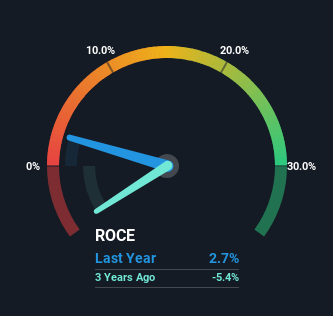- United Kingdom
- /
- Food
- /
- AIM:DKL
Investors Could Be Concerned With Dekel Agri-Vision's (LON:DKL) Returns On Capital

Did you know there are some financial metrics that can provide clues of a potential multi-bagger? Firstly, we'd want to identify a growing return on capital employed (ROCE) and then alongside that, an ever-increasing base of capital employed. If you see this, it typically means it's a company with a great business model and plenty of profitable reinvestment opportunities. Having said that, from a first glance at Dekel Agri-Vision (LON:DKL) we aren't jumping out of our chairs at how returns are trending, but let's have a deeper look.
Return On Capital Employed (ROCE): What Is It?
For those who don't know, ROCE is a measure of a company's yearly pre-tax profit (its return), relative to the capital employed in the business. The formula for this calculation on Dekel Agri-Vision is:
Return on Capital Employed = Earnings Before Interest and Tax (EBIT) ÷ (Total Assets - Current Liabilities)
0.027 = €1.2m ÷ (€55m - €11m) (Based on the trailing twelve months to December 2022).
Thus, Dekel Agri-Vision has an ROCE of 2.7%. In absolute terms, that's a low return and it also under-performs the Food industry average of 8.6%.
Check out our latest analysis for Dekel Agri-Vision

Above you can see how the current ROCE for Dekel Agri-Vision compares to its prior returns on capital, but there's only so much you can tell from the past. If you'd like to see what analysts are forecasting going forward, you should check out our free report for Dekel Agri-Vision.
The Trend Of ROCE
When we looked at the ROCE trend at Dekel Agri-Vision, we didn't gain much confidence. Around five years ago the returns on capital were 12%, but since then they've fallen to 2.7%. Given the business is employing more capital while revenue has slipped, this is a bit concerning. This could mean that the business is losing its competitive advantage or market share, because while more money is being put into ventures, it's actually producing a lower return - "less bang for their buck" per se.
The Key Takeaway
We're a bit apprehensive about Dekel Agri-Vision because despite more capital being deployed in the business, returns on that capital and sales have both fallen. It should come as no surprise then that the stock has fallen 33% over the last five years, so it looks like investors are recognizing these changes. With underlying trends that aren't great in these areas, we'd consider looking elsewhere.
On a final note, we've found 2 warning signs for Dekel Agri-Vision that we think you should be aware of.
If you want to search for solid companies with great earnings, check out this free list of companies with good balance sheets and impressive returns on equity.
New: Manage All Your Stock Portfolios in One Place
We've created the ultimate portfolio companion for stock investors, and it's free.
• Connect an unlimited number of Portfolios and see your total in one currency
• Be alerted to new Warning Signs or Risks via email or mobile
• Track the Fair Value of your stocks
Have feedback on this article? Concerned about the content? Get in touch with us directly. Alternatively, email editorial-team (at) simplywallst.com.
This article by Simply Wall St is general in nature. We provide commentary based on historical data and analyst forecasts only using an unbiased methodology and our articles are not intended to be financial advice. It does not constitute a recommendation to buy or sell any stock, and does not take account of your objectives, or your financial situation. We aim to bring you long-term focused analysis driven by fundamental data. Note that our analysis may not factor in the latest price-sensitive company announcements or qualitative material. Simply Wall St has no position in any stocks mentioned.
About AIM:DKL
Dekel Agri-Vision
Through its subsidiaries, develops and cultivates palm oil plantations in the Republic of Cote d’Ivoire.
Good value low.
Similar Companies
Market Insights
Community Narratives



